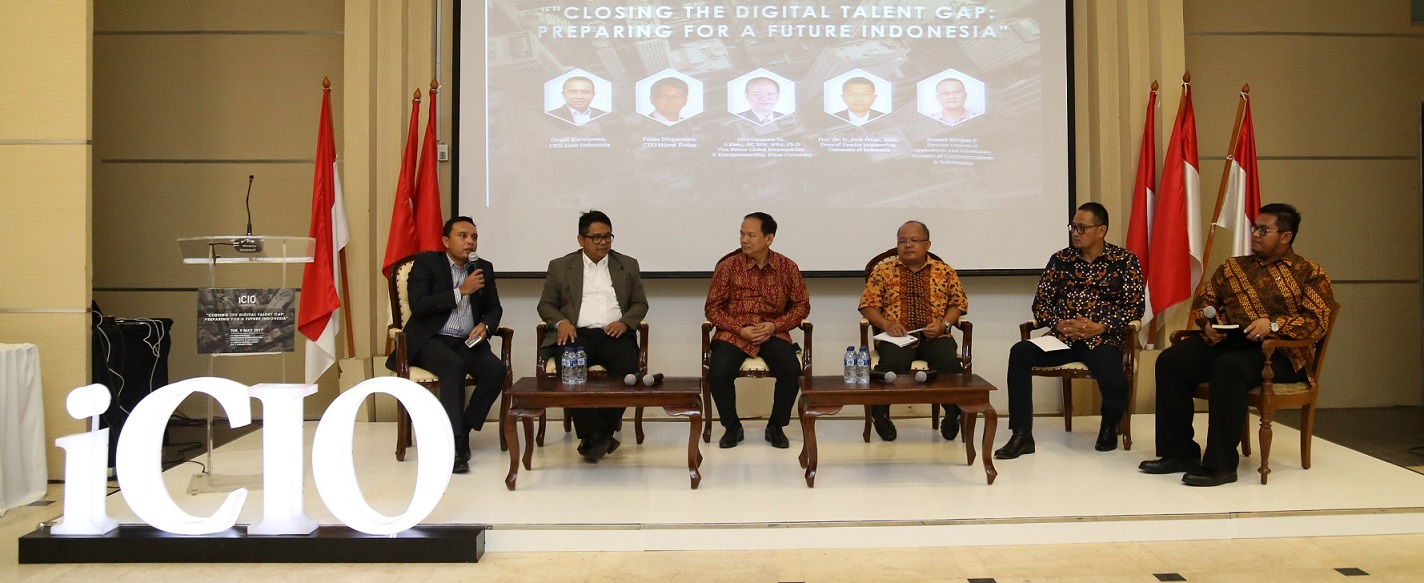Uniting to solve Indonesia’s ICT ecosystem woes
By Yunnie Marzuki May 16, 2017
- Five major issues have been identified and need to be resolved
- Talent gap need to be urgently narrowed for digital transformation to progress

ICIO, an Indonesian community of senior IT leaders and decision-makers have nailed down the five main hurdles in the ICT ecosystem which are holding back digital transformation efforts as well as economic growth.
iCIO Community chairman Agus Wicaksono feels the five issues have a profound impact on the overall business and commercial transactions needed to support economic development and growth. The implications to businesses are clearly seen in the significant loss of opportunities.
“These issues should be raised by us as a community to the government as well as stakeholders in education and all types of industry,” he says at a recent press conference.
The five issues
The top five issues are the ICT infrastructure gap, data residency, data privacy, standard information exchange, and the talent gap.
The infrastructure gap can be clearly seen in the low internet penetration rate especially in the Eastern part of Indonesia. It causes loss of opportunities in new business investment and potential digital growth in those areas with limited access to connectivity.
As far as data residency is concerned, some companies struggle to move or store data in data centres or the cloud. The high costs involved could limit or hinder the free and fast exchange as well as flow of information that could be critical to sustain businesses.
Awareness of data privacy in society at large and among service providers is significantly low. This is becoming a great concern as data, especially personal data, is floating around without prior consent or authorisation opening the gates to potential abuse and cyber security threats.
Since the potential for data misuse is high, trust will be quickly eroded, affecting economic growth. The lack of clear regulations and respect for data privacy could adversely impact investments flowing into the country.
It is expensive for domains and parties to interact and transact under various formats and on multiple information exchange platforms. The cost makes it difficult if not impossible for new businesses to access more customers and creates a barrier to entry.
In 2012 almost 47% of the Indonesian workforce was categorised as low-skilled labor, according to the World Bank.
The talent gap is a huge concern within the digital ecosystem. The lack of talent as well as the gap in skills and knowledge make it hard for players in the sector to carry out successful digital transformation programmes.
Closing the talent gap
To close the talent gap, iCIO Community along with players from the private, education, and government sectors held a discussion recently in Jakarta.
At this event, iCIO Community signed Memorandum of Understanding (MoU) with two local universities, Universitas Indonesia Faculty of Engineering and Universitas Bina Nusantara (Binus) to enhance the education system and build a talent pipeline to the Indonesian digital ecosystem.
“As a private institution, we always apply curriculum for our students to obtain knowledge and experience at the same time. We have seminars on technology, internship programmes for students to work in the industry and we make sure that all the steps have to be followed,” said Binus University Global Employability and Entrepreneurship vice rector Idris Gautama.
Universitas Indonesia Engineering Faculty dean Dedi Priadi says it is important to share knowledge in all fields as each of them will have a “specific market”.
“We as a public university always make sure that our students will be able to adapt their knowledge and skills to the working world. We accomplish that by bringing real problems from the industries and letting the students solve them so it will boost their talent and knowledge.”
Companies, for their part have to give this talent a chance to apply what they have learnt by providing more job opportunities especially in IT-related fields.
“There is a big talent gap especially with regards to capability. We are trying to acquire more talent because eventually, demand for IT talent will grow and the challenge for the industry is to create a talent pool,” says iCIO Community secretary general and LINE Indonesia chief executive officer Ongki Kurniawan.
Hired Today chief executive officer Frans Dirgantoro feels a solution is needed to reduce the gap between talent and industry.
“In the working world now, the rate of acceptance for a company to hire the right people is low. That is why we need a solution to cut the gap between talent and industry,” he explains.
For the government, it is important to set regulations and programmes to support growth in the digital ecosystem.
“We are the followers in this digital ecosystem and we are always open to any discussion on concerns from the community, industry, and education in the digital world that could affect economic growth in Indonesia,” says Indonesian Ministry of Communication and Information Application and Information director general Semuel Abrijani.
Related Stories:
Three traps to avoid on the path to digital transformation
Indonesia promotes the use of data for policymaking
Hybrid cloud and the changing horizon of Asia-Pacific enterprises
For more technology news and the latest updates, follow us on Facebook,Twitter or LinkedIn.


